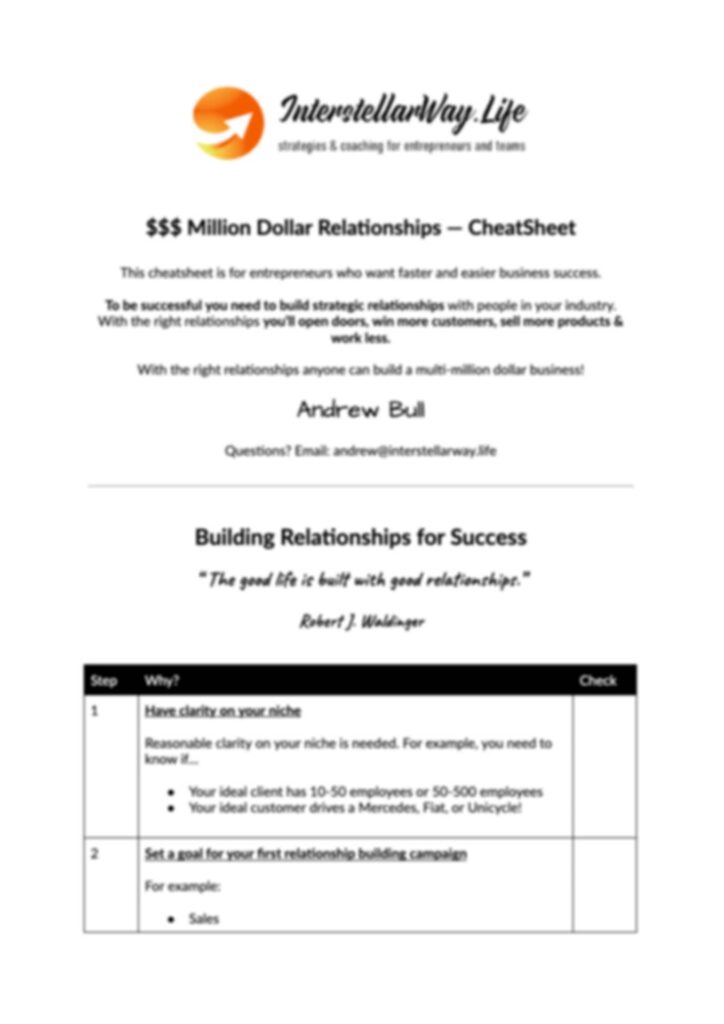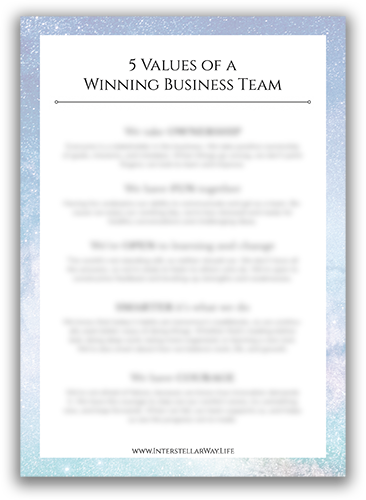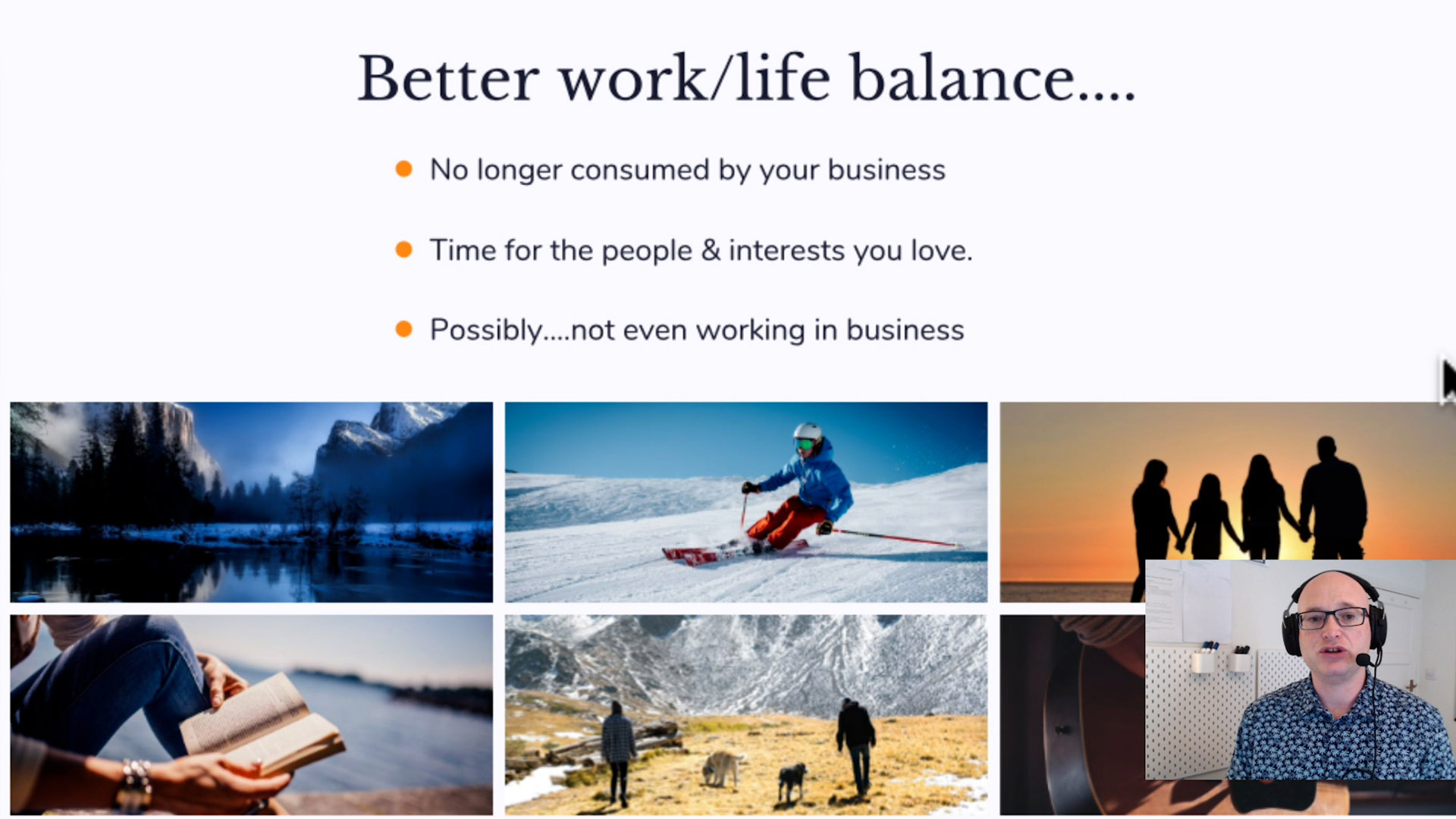Interstellar Business Show
Podcast for Technology CEOs and their teams.
It's time to grow your mind, elevate performance, and own your future 🚀

Interstellar Business Show
Episode: 0034
0034 - Alexis Kingsbury on Smart Streamlining
Featuring....
Episode Introduction
It’s no secret…
That a scalable business ( the kind of business that can grow and grow ) is an organised business.
So why do many leaders struggle with getting their business truly organised?
Is it because?
— They don’t know any better?
—They prefer to wing it?
Or more likely…
It’s because they’ve tried and failed to get organised in the past?
Well, here’s the good news…
Today, Andrew is joined by an expert who’s going to help you ….
- Document and streamline your business processes the smart way
- Save tonnes of money and time in your business
- Lighten your load…. By helping you delegate more to your team
- Give you actionable steps for getting started with what you learn today
Please make sure you subscribe and follow us wherever you’re listening today, so you never miss an episode again.
Episode notes & resources
Connect with Alexis Kingsbury:
https://www.linkedin.com/in/alexkingsbury
https://twitter.com/alexiskingsbury
https://www.facebook.com/alexis.kingsbury
Love this podcast episode? Please leave a review here
Listen to more episodes here: Interstellar.Show
Get Andrew’s free Resources for Leaders with teams → https://bit.ly/2Ygyoij
Join Andrew’s Interstellar Community → https://interstellarway.life/sign-up-for-newsletter/
Transcript
Please note, this transcription is autogenerated, so there may be errors.
[00:00:00]
Andrew Bull: It’s no secret that a scalable business, the kind of business that can grow and grow is an organized business. So why do many leaders struggle with getting their business truly organized?
Is it because they simply dunno any better? Or perhaps they prefer to wing it? Or more likely it’s because they’ve tried and failed to get systemized and organized in the past.
Well, here’s the good news today. I’m joined by an expert. Who’s going to help you:
Document and streamline your business processes, the smart way.
Save tons of money and time in your business.
Lighten your leadership load by helping you delegate more to your team.
Lastly, you’ll get actionable steps for getting started with what you learn during today’s episode.
Now, before we get started with today’s show, please make sure you subscribe and follow us wherever you are listening [00:01:00] today. So you never miss an episode again.
Welcome to another episode of the inter Stella business show. Today I’m joined by Alexis Kingsbury. Welcome to the show, Alexis.
Alexis Kingsbury: Thank you very much,
Andrew Bull: Yeah. Awesome to have you today. So, so can you tell us a little about what you do and your business is it’s called air manual. Is that right?
Alexis Kingsbury: That’s right. Yeah. So I’ve got a, a few software and consulting business. Uh, one of which is air manual in which we provide, uh, an online tool for, uh, team process management and also role onboarding through, uh, interactive checklists and, and so on. We can explore that further.
Andrew Bull: Okay. Cool. All right. Let’s rush forward into the first segment of the show, which is called have courage. So in this first segment of the show, our guest shares a story. Of how they’ve showed courage or something formative about themselves. So what’s your story of courage you want to share with us?
Alexis Kingsbury: Sure. So I have a son who, when he was seven years old, he got [00:02:00] given a skateboard and he said to me, daddy, will you learn with me? And I had never skateboarded before. Um, but I didn’t have a good reason to say no because, and I, I thought anything. I say like, no, I could get really badly injured , which would be perfectly logical.
, unfortunately would apply to him too. And I, I didn’t feel that was appropriate. I, uh, did, uh, and he helped me to it. And we started to learn together and I fell and a few times badly. And it was on one particular time when I was sat on a part bench, sort of thinking how stupid am I, I’m gonna break my wrists and then be able to go work, which is quite important.
If you own software business is and work remotely to be able to use your wrist and work on keyboards. And, um, he came over to me and said, are you all right, Daddy? And said, yeah, just a bit winded. All right. And he said, Daddy you just need to learn more? and I realized that that’s, that’s the sort of advice that I’d, I’d give to him if he was struggling with something and, uh, and, and making mistakes.
And I realized that’s so true. And so I sat there and got a YouTube video [00:03:00] out and learned what I was doing wrong and ever since then have not fallen off the skateboard and actually ended up really enjoying it. And we skateboard to school, uh, many mornings and there’s even been times where I’ve skateboarded without him just cuz I enjoy it.
And it’s fast.
Andrew Bull: Wow. Cool. That’s great. I’d love to skateboard. I never really got around to that. More of a roller skate when I was a kid, but I think it is very interesting what you’ve said there about being open to learning and never knowing where that learning’s going to come from. I suppose, normally you. Would expect it to be the other way around.
Right. And if you didn’t have the right attitude and if you weren’t open, you might reject that advice from your son.
Alexis Kingsbury: Absolutely. Yeah, no, it’s, it’s fantastic advice for pretty much any part of our life. If. If you’re not getting the results you want, you just need to learn more.
Andrew Bull: Yeah. Cool. Yeah, it’s a good one. All right. Let’s move forward into our next segment of the show, which is called
the big idea.
So in this era of the show, our [00:04:00] guest is going to share a big idea, which will help you elevate your mind, your team, or your business. What’s the big idea you’re going to share with us today, Alexis.
Alexis Kingsbury: So I’d say the big idea is that I think most business leaders, uh, understand that documenting processes and, and having written down training and so on. Uh, useful and important thing that they should probably have. Uh, but so many accept the status quo of that being in a rubbish state where it, where it might be, uh, easily going out of date, it’s clunky, it’s difficult to follow.
Not everyone even bothers to access it. They certainly don’t improve it. And, uh, or perhaps they’ve been burnt before they feel like they tried to document things or they, or they know they probably should, but just never get round to it. So I guess the big idea is. From my experience of, and I’ve got many years as both a management consultant and building my own businesses and now working with many businesses to improve their processes and set up process management is that actually there [00:05:00] are, there is a far easier, better way of doing it and that by investing the time in.
Documenting processes in, uh, and particularly creating, self-service checklists for people to get started in a new role. You can save hundreds or even thousands of hours of your own and, uh, time and the leaders’ time. You can eliminate mistakes or at least, uh, repeated mistakes. And you can get new joiners up to speed in incredible, uh, incredibly short periods of time whilst also not having to take a load of time from yourself, your leaders and other members of the team.
Andrew Bull: First of all, something that really, sticks out to me there, it’s about eliminating waste and we’re in this really pressurized moment right now in the economy. And it doesn’t really matter what size of business you are. I mean, if you’ve a small business, obviously you’re gonna have perhaps more cash flow pressures.
But if you are a bigger business, you you’ve got different pressures and you’re still looking at where you can cut costs. So it seems kind of [00:06:00] crazy to waste time on ineffective processes, which just aren’t very well put together. How much, how much can you save? Have you got any examples of where people have like really made some dramatic saving.
Alexis Kingsbury: Yeah. So in one example, I was talking to a business leader who they said, oh, you know, I definitely need this Alexis. And, you know, really like the tool and all this kind of stuff. I dunno where to start. And, perhaps I need to go discuss it with the team and da, da, da, and like adding more obstacles.
Right. And friction. And so I, I said, well, like, where are you spending most of your time at the moment, he said, I’m spending about three hours a day, doing price quotes for customers said 15 hours a week, just doing quotes for customers. I said, well, and he said, I know I probably need to spend about eight hours.
Get it documented handed over. Um, but I’ve just not found the time now. Of course, if that’s true, then eight hours invested three, three days later, he’d get that time back because he’d, he’d have, you know, been hand that. In reality. I said, well, we’ve got 45 minutes left on the call. Let’s see what we can do.
We got the whole thing documented in [00:07:00] 45 minutes. And in a subsequent call, we got it handed over to his account managers. And it’s great. Cuz on our impact review call, I said, well surely the biggest benefit you’ve had is that you’ve now saved 15 hours a week. Having spent three hours on course and me including like the demo call, like the initial conversation.
And he said that has been great, but actually the biggest benefit has been that customers now. Their quotes back in minutes or hours rather than days or weeks and what the impact that has on conversion and so on. And so I think that’s the amazing thing is that, and, and we’ve got loads of other examples where people.
Uh, onboarded staff members. And normally that have expected to spend five hours a day for four weeks sort of spoon feeding the, the new joiner. And instead by having it documented, self-driven like I hired two sales consultants in November last year, and they got up to speed and able to do cause with customers in seven days.
And I spent a total across both of them an hour and a half of. and so, and we’ve done that for loads of other clients. Like it’s, [00:08:00] it’s incredible the amount of time you free up. Um, and, and not just, uh, freeing up from the initial training and onboarding and so on, but from repeated mistakes, you know, I’ve had, uh, people who will ask a question like, oh, uh, you know, I’m confused about this.
And I said, oh yeah, you’re right. I, I missed that. Here’s the answer now, please update the onboarding checklist and they update it. And I never get asked that question again, not by then, but also by anyone else that goes through the process. And so the amount of time that frees up. For a business leader is incredible.
You know, you’re talking about, uh, days and weeks and months worth of time for relatively small amount of time investor. But the key is to block out and make sure that you do invest that time.
Cuz otherwise most people say, oh, I, I would. Uh, you know, I would improve my time management, but I, I never have enough time to, to do it.
And of course it’s the wrong way around. It’s a return on investment.
Andrew Bull: So I think one of the things that really strikes me there [00:09:00] is the mental roadblocks then that people. To getting started with processes and changing their processes. So, um, as you mentioned, people find excuses, don’t they, you know, I can’t, I can’t invest time now to save myself time later cuz I just can’t do it. When in fact, you know, you just spent 45 minutes with someone and got that thing done. So I suppose a big part of what you have to do when you are helping people is help them, uh, with the mindset, a part part of things as well.
Is that.
Alexis Kingsbury: Absolutely. I think that people really struggle with that. They imagine that it’s gonna take so much time and in reality, we can spend two or three hours with a business leader and save them literally days or weeks, uh, from their time. And, and so you just have to practice time blocking, and often one of the things that we’ve.
uh, clients really like is like putting the time in with one of our consultants means it happens. Whereas if you just said, oh yeah, I need, you know, that’s something I [00:10:00] need to do. It’s just too easy to put.
Andrew Bull: Yeah, that accountability is also kind of something that you’re paying for when you work with a good consultant or coach as well, really? Because yeah, when we’re not held accountable, it’s kind of a bit easier to skip out and find other things to do instead and procrastinate. Right. or or become a perfectionist, which is really just the flip side of procrastination as well.
So tell me more about the joining experience then what, what happens when a company is taking on new team members and they don’t have a good process in, in place. What’s the nightmare scenario?
Alexis Kingsbury: Yeah. So I suppose worst case scenario that some people might have seen is that the new joiner turns up and the man just says, oh, is that today? let me find you a desk. So that’s kind of worst case scenario, but I think even in an okay scenario, Um, the learning tends to be done very much through taking the time of others.
So it’ll be sitting down with the manager, sitting down [00:11:00] with the business owner, sitting down with their, their buddy and team members to be taught pretty rudimentary stuff that you would hope, uh, could be taught through a checklist or a video or a document or whatever, so that you’re not taking up that valuable time from the rest of the team.
Because ultimately you’re probably hiring because you’re busy because they are short on time. So you don’t wanna make that worse by then bringing in a team member. And I think as a result, a lot of business leaders hold back from hiring as a.
Andrew Bull: Yeah. I mean, I, I remember having that experience of joining companies and you’re excited you go there for the first day and then everyone’s too busy to actually onboard you and help you around. So often you, I, I would spend like big chunks of the first day just sitting there or try trying to be proactive, but really struggling.
To do that because you’re not familiar with anything yet. You don’t know anyone yet, so yeah. It’s so what, what can the, the dream scenario look like then if we’ve had the [00:12:00] nightmare of people like me in the past, sitting around not knowing what we’re doing, wasting time and being inefficient and, and also having a bad personal experience.
Right. It’s my first day, if it’s your first day in the business and you’re excited and all of a sudden you hit the brick wall straight away. As soon as you’ve started, then the wind’s going to be knocked out of your sales. And you’re like, oh, I was really excited. Now I’m slightly less excited. I’m disempowered.
I can’t move forward. So if this is the nightmare scenario, what’s the dream scenario. How can it be better?
Alexis Kingsbury: Yeah, I think there’s, there’s two big components to that, that dream scenario. So I think one is having a well organized, structured process of, uh, essentially role onboarding or onboarding for that employee. And I think a lot of people think of onboarding as just, oh, it’s the setting up the contracts and the payroll, but actually they’re doing great disservice to themselves in the, in the business, because really it should be right from, okay.
You’ve agreed that they’re going to join. So sharing information up front so that they’re [00:13:00] starting to think ahead to join the organization that you are perhaps allaying common fears and telling them what’s going to come. But also all the way through learning about the company, the products, the services, the, uh, ideal customer, um, and, uh, and so on, and then, and values, uh, and then going into role onboarding.
So helping them get happy and confident in their role and all the things that are gonna be required to achieve that goal. So they’re up to speed as quickly as possible. So firstly, that structure. Secondly, putting them in the driving. Because ultimately, if you can make it so that they can see what’s going to be involved and that they can take it at their own pace and they can refer back, you make it a much more pleasant experience.
And also you can give them opportunities where they can add value. They can share their ideas, uh, and own experiences. And, uh, if you can even get them to help improve that process as well, all the better. So I think that that’s the key is that then you. Do that you’ve got someone who feels really engaged and empowered and supported.
And like this is a company that [00:14:00] really care about people and how, and, and think about how things work and are looking to improve things. And as a result, they have a much better experience. And ultimately for the business, they’re able to have their new joiner up to speed, faster, adding value and, and reduce the burden on the rest of the team.
Andrew Bull: Awesome. Yeah, I think there’s a lot of upsides to obviously bringing people into the business the right way and just getting that momentum. And I think life is like a game of squash, right? You only get out of something, what you put into it, right? You hit that wall hard with your squash ball. The ball comes back hard.
And if you, you know, help your new starter get started the right way by putting a lot of value, a lot of thought into it. That same thing’s going to be happening inside the new starter. They’re gonna be thinking, this is a thoughtful, passionate, caring company. I want to be a thoughtful passionate, caring person inside the company.
So there’s so many, positive reasons for doing that. Now some people who are listing might think, look, Alexis, this all [00:15:00] sounds great. I get it. I need to document my process, but I’ve, I’ve signed up for this app or that app before I tried this process before, and I just ended up going back to doing it all manually and just turning up to work every day and starting from scratch, because that seemed easier.
What’s the common mistake that people make when they start documenting processes and trying to streamline things
Alexis Kingsbury: Yeah, so that there’s a few common mistakes. So one would be that they start off with a goal of thinking that they need to document the entire business on day one. And so they put a lot of time into documenting things without really starting with what’s the problem that you’ve got right now. What’s the frustration or what’s the time sink.
Cause ultimately if you start with that, then. Anything you do to address that issue is probably gonna deliver some kind of return investment rather than thinking of it as I need to document the entire business. So I’d say that’s the, the starting point is, is doing that. I think the, the next thing is that, uh, [00:16:00] trying to add too much detail into the process too soon.
I think the temptation is, oh, I’ll record a video and I’ll do this 20 minute video on how to do this particular activity. Or I’m going to create this massive document with so many screenshots. It’s like this a hundred page word document. And actually what we’ve found is that you can start off just by identifying what’s the goal of this activity and what are the high level steps.
And even that as a starting point, passing that over to a team member so that you are, you know, delegating and getting it off your radar means that they, you can then support them in building out the most important bits. So if they say, oh, you know, I, I dunno how to log onto this system. It’s not obvious how to do that.
You can go, okay, well, let’s put the link in there. Um, and then they say, okay, I know the next few, that will make sense to me. Uh, it says, apply the correct tax rate. Uh, how do I know. To their correct tax rate or whatever. And that’s where you then add that additional information so that you’re not just providing it into their memory.
And I think by doing that on a regular basis and not trying to, as I say, do everything all on day one, but handing off those [00:17:00] activities to keep people that’s when you start to over time, build up something that’s really quite powerful. And, whether people use, air manual or some other tool or whatever, it’s crucial to make sure that all that information is organized really well, so that you don’t end up a year or two later with just one massive folder, with everything that sits in there and really difficult to find you, you really should look at some kind of process management tool that helps organize that that’s searchable, that does those things cause otherwise you will end up in a, in a state after, after creating a lot of that kind of stuff.
Andrew Bull: So I shouldn’t try and document everything just in one Google doc.
Alexis Kingsbury: no,
Andrew Bull: Okay.
Alexis Kingsbury: not.
Andrew Bull: Okay. All right. Cool then. So what would be a good first baby step for people to take then?
Alexis Kingsbury: Yeah. So I’d say the, the a little baby step that people can take is to start by listing out some of the key responsibilities that you’ve got, and particularly identifying, which are the ones that need to come off your plate. [00:18:00] Because then by identifying the, you know, 2, 3, 4, responsibilities that you have, for example, chasing up invoices or, reaching out to, potential partners or whatever it is, um, you can identify, okay, this is a responsibility that currently is on my plate and I want it on someone else’s.
And by doing that it, then, if you were to take another step you’d, then take one of those. For example. Chase invoices and turn that into a separate document where you list out. Okay. Chase invoices. That’s the process. The description would be we chase invoices to make sure we get paid on time and so on.
And then here’s the key steps that we do. And by doing that, you’re starting to break that down so that you can pass it to someone else. So I think. But if you start off by just identifying, what are the processes that you are doing, it becomes so much easier to see what you should delegate. Whereas, otherwise I think it just becomes this big, scary thing called, oh, I need to document, oh, I need to delegate, but without the clarity on what you need, where you need to start.
Andrew Bull: I think that’s great advice. And if [00:19:00] people want your help taking the next big step, how can they, how can they work with
Alexis Kingsbury: so we are fortunate to have a, a team now of expert process consultants that have done this with lots and lots of organizations. And so people can get a free call with them. In fact, a free series of calls with them to identify a specific problem to solve and to actually solve it. And if air manual’s the right.
Tool for that then. Great. But ultimately we can, we can help them achieve that goal. And so they can do that by going to air manual.coach, air, manual.co, uh, where they can then arrange a, a call with a member of the team to kind of go through that. We also have some resources available, webinars, eBooks, et cetera, uh, to focus on particular problems, but I’d really recommend having a call with the team cuz we’ve had people say, ah, you know, I feel lighter.
it’s coming. This stuff’s coming out of my brain and getting documented. So I think that that’s, that’s really where to.
Andrew Bull: Yeah, it’s interesting what you say about lighter, because I think we, we were talking about cost earlier and we were talking about the financial and hourly cost, [00:20:00] but there’s also a mental cost to carrying things around in your head the whole time. And you might assume when you are not directly working on something, you don’t have your tasks open in front of you, and you’re not focused on something that when you’re not thinking about that stuff, you’re not processing it in your mind, but actually you always are. You’ve always got those browser windows open your mind, going thinking about, oh, I need to send these five things or do these other five things. So there’s like this mental opportunity cost. To not getting this stuff sorted as well. So I think that’s brilliant.
Let’s move on to the next segment of the show, which is called
own your future.
So Alexis, you are building out a vast business empire, you know, like, uh, in star wars, duh, duh, duh, duh.
Alexis Kingsbury: completely agree.
Andrew Bull: So, uh, like how do you stay on track and on powered while you do this?
Alexis Kingsbury: Yeah, so there’s a variety of, uh, techniques and things that we’ve, we’ve got [00:21:00] in place to, to make sure we do that. Um, we’re big believers in meeting rhythm and, and having structure so that we are doing our quarterly planning. And then we have our, our fortnightly exec meetings and our daily huddles and so on that provides a lot of structure.
Uh, I’m also a big believer in having a, to do list, but being really specific about what’s the one thing that. Make everything easier or help me take a big step. And then what’s the three things I commit to today. Uh, I have a checklist to help me be as impactful as I can every day. And then I use time blocking, I look at my calendar and say, okay, when am I gonna make time for these big important things to, to make sure that I make progress against the, the rocks, the, the objectives that we set on our quarterly plan and so on.
So it all feeds through and I think. It’s um, that great quote, which I think is that, uh, Steven Covey was put the rocks in first, you know, identify what’s the most important things. And then put those things into the, in this case calendar and make sure that those get done first, rather than allowing [00:22:00] the day to day the, the emails, the noise, to mean that you never have any time for any of those things.
Andrew Bull: Yeah, I think just being able to lay everything out and get everything clear, just makes everything so much easier. That’s awesome. Do you think AI’s going to affect your business?
Alexis Kingsbury: I think it, it will. I think there’s a variety of different ways in which it can be used. I think. Like any technology, you get a bit of a hype cycle. So everyone gets really excited about it. And then anyone from goes, oh, it wasn’t what we expected from it. And then it gently climbs up the other side as you start to find, specific things that it can be used for.
So, for us, one of the things that’s interesting is, uh, providing content and guidance for people on how to do a really good job of the, of the things that we’re doing and, uh, how to, um, uh, do particular processes in your business in a, a really interesting way. And so for us, AI may provide. Uh, the ability for us to help business leaders who are documenting a process by saying, oh, you know, essentially a little bit like [00:23:00] Clipy from, uh, Microsoft where it used to go, oh, it looked, it looks like you’re creating, creating a process for sending invoices.
We’ve got a template here and you know, those sorts of things. I think there’s a, there’s a variety of ways in which we can, um, help people learn and improve their processes. Are they? And there’s also. AI, um, opportunities for us to look at how are people, uh, using checklists and, uh, to identify where there are opportunities for them to make things faster or less or whatever.
So I think there’s a variety of ways which we can use it, but it’s gonna be one of those areas that I think people get very excited about. And then very disappointed in before, uh, before we start see the, uh, the big use cases, shake out
Andrew Bull: Yeah, I kind of feel like people should have a license to use the term AI, cuz it just gets thrown around nowadays it’s like for a lot of people, , they they’re calling the equivalent of a macro in Google sheets,
uh, AI. So, you know, I think we need to have a bit of reality check and go. We’re not quite there.
We’ve got some very clever [00:24:00] stuff and maybe Google and, and that type of people have, you know, some very clever stuff talking a Clipy I’ve got eyebrows that are almost as good.
So, if you watch this on YouTube, then you’ll be able to check that out.
Alexis Kingsbury: You’ll have to audition if we ever, ever do it.
Andrew Bull: That’s it. You could just have my face coming on there. Do you need some help with this process?
Alright, let’s move forward to the next and last segment of the show, which is called
take action.
So what’s the big lesson that you want people to take away from today. If people can’t, uh, totally obliterate everything else from their minds, they can only remember one thing, Alexis, what should that thing be?
Alexis Kingsbury: Yeah. I’d, I’d say it’s block out the time to free up your time. I think the, the, otherwise it never happens. You always end up on the treadmill. So. Allocate sometime block it out in your calendar. And if you struggle to then hold to it, then perhaps book, book it in with someone, whether it’s a member of my team or just a friend or a [00:25:00] member of your team, whatever, like book out that time, block it in the diary, make sure it happens and invest that time.
Specifically focus with the aim of freeing up, freeing up more time in future. Uh I’m yet to whenever I invest time like that, I’m yet to find a single session where I don’t free up way more than the time invested within a week or two.
Andrew Bull: That’s great advice. I think that’s that? That’s so true. You’ve gotta, you’ve gotta block out that time and commit to the change. Otherwise it’s just never going to happen.
And Alexis, where can people reach out to learn about you? Where can they go to?
Alexis Kingsbury: Yeah. So I’d recommend that people, check me out on social media. You can find me Alexis Kingsbury. I’ve got a pretty unusual name, so I’m easy to find. But also you can find out more@airmanual.co. Yeah, we’ve got loads of resources that you can access, but otherwise feel free to email me Alexis dot kingsbury@airmanual.co.
I’d love to hear people’s questions and, help in any way. I can.
Andrew Bull: Awesome. Thanks for coming on the show today, Alexis really appreciated you being here.
Alexis Kingsbury: Thanks very much great to be here.
Andrew Bull: my thanks to Alexis for sharing his expertise today. [00:26:00] I certainly learned a lot. My big takeaway from today is that there are some important beliefs that are holding us back when it comes to scaling out our businesses, or even just having a few extra moments with your loved ones.
For example, the belief that documenting and streamlining processes is a waste of time. This belief is going to trap us. If we believe in it in forever repeating work forever, doing things a slow way forever having to do the work ourselves. What’s more, it will also make our businesses less secure. Because what happens when the one person who knows about a process in your business is no longer available. The process can’t happen and your business or a project is at risk.
And it’s for this very reason, I’ve decided to commit to continually documenting and streamlining my business processes. And I’m convinced you should do the same too. [00:27:00] Before I wrap up, I want to let you know that I’m on LinkedIn and that I’d love to connect with you on LinkedIn.
So just search for Andrew Ball. That’s B U L L on LinkedIn, and you will find me.
Now if you haven’t already done so hit that subscribe or follow button wherever you are listening today. And all I’ve got left to say is thanks for being here.
Have courage, own your future, take action.








